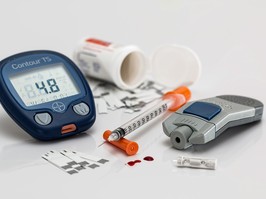are you at risk of prediabetes? important steps you can take now to change your health
mario miceli lives with regret and guilt. he wishes he could go back 14 years to when he was 42, and a doctor told him he had prediabetes

“i want people to avoid doing what i did. i wish i had accepted the wakeup call of my prediabetes diagnosis. now i am doing what i can to ensure others don’t follow in my footsteps.” mario miceli lives with regret and guilt. he wishes he could go back 14 years to when he was 42, and a doctor told him he had prediabetes. instead of ignoring the diagnosis—as he did for years—miceli would have taken it seriously and made the necessary changes, including getting more exercise, losing weight, and regularly checking his blood sugar levels.
prediabetes is a condition where a person’s blood sugar levels are higher than normal, but not high enough to be diagnosed as diabetes. “i didn’t handle the diagnosis well,” says miceli, now 56. the retired insurance industry executive, who lives in burnaby, b.c., and is the father of two adult children, adds, “i did what a lot of men do when it comes to health issues—i ignored it and hoped it would go away. and that was a crucial error.”
four years after his doctor told him he had prediabetes, miceli was diagnosed with type 2 diabetes and high blood pressure. he was prescribed insulin because he had extremely high sugar levels—but even then, he admits, he was not careful about checking his blood sugar regularly. his wakeup call did not come until almost 10 years after his initial prediabetes diagnosis. he was 52 when his doctor told him his kidney function was impaired. “that freaked me out. the damage was significant and it was a direct result of the diabetes,” miceli says.
advertisement
while waiting for an appointment with a kidney specialist (nephrologist), miceli had a frightening low blood sugar episode. he awoke in the middle of the night, woozy and sweaty, and thought he was having a heart attack. when he tested his blood sugar, it was just under 3 mmol/l. he stumbled to the kitchen. “there was a piece of cake in the fridge and i started eating it, standing there with the fridge door open.” he checked his blood sugar every few minutes and finally, after an hour, it was back to normal. this experience is what finally made him take his diagnosis seriously.
a wakeup call
not taking prediabetes seriously is a mistake a lot of people make, says dr. harpreet bajaj, a community-based endocrinologist and research associate at the leadership sinai centre for diabetes at mount sinai hospital in toronto. “because there may not be any symptoms, initially people can go into denial. they think it’s not that bad, that diabetes is not going to happen to them. but for 60 to 70 per cent of people, it will progress to diabetes over time.”
not taking prediabetes seriously is a mistake a lot of people make, says dr. harpreet bajaj, a community-based endocrinologist and research associate at the leadership sinai centre for diabetes at mount sinai hospital in toronto. “because there may not be any symptoms, initially people can go into denial. they think it’s not that bad, that diabetes is not going to happen to them. but for 60 to 70 per cent of people, it will progress to diabetes over time.”
diabetes prevention starts when we are young — in our 20s and 30s—when healthy habits such as regular exercise and a balanced diet should be established, says bajaj, one of the co-authors of the reducing the risk of developing diabetes chapter in the diabetes canada 2018 clinical practice guidelines for the prevention and management of diabetes in canada. but it is never too late to make changes, says bajaj, who is also the principal investigator for the canadian diabetes prevention program (cdpp), a free personalized lifestyle management program for those with prediabetes or at high risk for type 2 diabetes. he notes that a loss of five to seven per cent of one’s body weight can reduce the risk of progression to type 2 diabetes by almost 60 per cent. the risk is also significantly reduced by taking metformin, yet less than 10 per cent of people will go on the drug when they have prediabetes. “they don’t want to take medication and would rather focus on lifestyle. metformin reduces the worsening of diabetes over time and yet it’s underutilized,” he says.
advertisement
[pn-pullquote text=”prediabetes is a disease, and not solely a lifestyle problem—often people just don’t grasp the depth of the seriousness of it” source=”dr. harpreet bajaj, endocrinologist and researcher”/]
on an individual level, bajaj stresses the importance of being screened for diabetes, and points to tools such as the canrisk test, which asks questions to help you determine your risk level. on a national level, prevention strategies will require changes to public health policies, such as a tax on sugar-sweetened beverages—an initiative to reduce people’s consumption. “obesity is a growing problem across the western world—it’s a public health problem and legislation has to be enforced,” bajaj says.
miceli cannot turn back time to change the course of his prediabetes diagnosis, but since the episode of his dramatic low he has become much more diligent about his health. he has lost 25 pounds and is careful about monitoring his blood sugar. “controlling diabetes is all about mitigating the risk of complications such as stroke, heart disease, and amputations,” he says. “the impact on your quality of life is significant.”
eleven million canadians live with prediabetes or diabetes, a number that has doubled since 2000. in an effort to ensure others do not make the same mistake he did, miceli is now a volunteer advocate with diabetes canada, speaking to community groups, politicians, and the media. he wants to raise awareness of the disease and bring attention to diabetes 360⁰, diabetes canada’s framework for a national diabetes strategy to coordinate the efforts underway in all provinces and territories to combat this epidemic.
advertisement
as advocacy chair for diabetes canada’s bc/yukon region, miceli was part of a group that successfully recommended that the provincial government provide insulin pump coverage for all eligible people in the province, regardless of age. he also speaks to men’s groups to urge them to get screened for diabetes and to follow a proper treatment plan if they are diagnosed with the disease. “as men, we sometimes don’t take health issues seriously, and i certainly fell into that trap,” he says. he also addresses the shame. “you feel it’s a self-inflicted disease, one that has a lot of judgment associated with it, even though genetics plays a huge role. i didn’t know that at the time and i didn’t want to talk about having a chronic [disease] that seemed to have been brought about because of my lifestyle. it was incredibly selfish of me not to deal with this illness, and i feel guilty that i didn’t take good enough care of myself. i saw it as a sign of weakness and i wasn’t open about it.”
[pn-pullquote text=”advocates like mario are the best people to speak to elected officials, bureaucrats, and key influencers in the community to share their personal stories, and to explain the personal and economic impact of diabetes and why we need a national diabetes strategy” source=”joan king, public affairs and advocacy lead (west), diabetes canada”/]
advertisement
joan king, a public affairs and advocacy lead (west) for diabetes canada, who has worked with miceli, says, “people are affected by personal stories that are impactful, and mario is mobilizing people by sharing his story of how he neglected his diabetes through the years. he is passionate and driven and is bringing hope to others about how to get the support that they need.”
miceli is no longer in diabetes denial and he is eager to share his experience with anyone who will listen. “this is a chronic disease you simply can’t ignore.”
learn about the new canadian diabetes prevention program now.
are you at risk?
high blood pressure, a family history of diabetes, and being over the age of 40 are some of the factors that may put you at risk for type 2 diabetes. however, many people may not have any symptoms initially. the earlier you are diagnosed, the sooner you can take action to stay well.
high blood pressure, a family history of diabetes, and being over the age of 40 are some of the factors that may put you at risk for type 2 diabetes. however, many people may not have any symptoms initially. the earlier you are diagnosed, the sooner you can take action to stay well.
to find out more and to complete an easy checklist, visit are you at risk.
this article appeared in diabetes dialogue.
disclaimer: this section has been written/provided by diabetes canada with the goal of educating canadians. the content on the website is intended for educational and informational purposes only. the content is not intended to provide medical advice and, to the extent that medical advice is required, users should consult with qualified medical professionals.
 6 minute read
6 minute read





